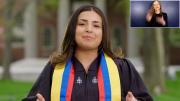Creating–Not Accepting–Our New Normal
The morning of my first day of kindergarten, I woke up ready to take on the day. At five years old, this was the start of a new life, with new routines, new friends. A new me. After choosing the perfect first day of school outfit, I was out the door with a belly full of arepa con queso and a blue butterfly clip holding my wet hair. My little body exuded confidence on my way to school. Each stride more fierce than the last. I felt larger than life.
The door to my classroom swung open. I caught a glimpse of dozens of other kids, some still eating breakfast on their freshly laminated place mats and others already claiming their cubby on the top shelves. After setting my bag on the floor, my mother kissed me goodbye and said, Este es el comienzo de tu nueva experiencia. “This is the beginning of a new experience.” My stomach dropped. Before she could take another step towards the door, I was at my mother’s feet—legs and arms wrapped like a sloth around her leg and tears streaming down my face like a water slide. The thought of having to confront this new world on my own was terrifying.
For the last couple of months, we’ve all been told that we are heading towards a new normal. And it makes sense. After a virus claims the lives of almost 3 million human beings around the world, there is no way to go back to the life we were living before January of 2020.
But COVID-19 is not the only virus that has claimed the lives of innocent people in the last year. We have watched as a failed healthcare system has compromised the lives of those who are a part of unhoused communities, undocumented communities, low-income communities and every other human being who has been denied equal access to healthcare during this time of crisis. We’ve been witness to the murders of Black people by those sworn to protect them—murders that have been normalized and justified for generations. We’ve witnessed the murders of Asian Americans as a result of xenophobia perpetuated by divisive political leadership spewing hateful and dangerous rhetoric.
White supremacy has added fuel to the fire that had already given us so much to mourn. Racism. Xenophobia. Classism. As a collective, we have come face to face with the aspects of our society where we are lacking—where we need to learn from one another and be better. The last year has also shown us where our strengths lie. Oftentimes, we’ll find that our communities are the source of these strengths. Last March, as the news of an online semester created unimaginable chaos in everyone’s life, we low-income students were faced with unique struggles and barriers as we navigated the unknown. The first-generation community stepped up to provide financial and emotional support to its members. Despite our different realities, we were there for one another.
A Harvard degree comes with a high level of responsibility. Our communities look to us as leaders and change makers. Once we figuratively leave the Harvard Yard that has been home to tears, laughter, and memories we will never forget, the onus will be on us, the class of 2021, to lead the change towards a new normal. The generations to come are looking up to us as we put out fires and lay the foundation of a world that they will be proud to be a part of.
When I imagined this day, I pictured tens of thousands of people all crammed into Tercentenary Theater—the place that is home to countless memories that have adorned and defined our Harvard experience. I pictured myself marching all the way from Mather House into the Yard that once welcomed a doe-eyed first year trying to find her way to Wigglesworth Hall, recalling another late night in Lamont and early morning in Widener with every step. Most importantly, I pictured myself presenting my cap and gown to my parents and my brother as a way to thank them for their sacrifices and unwavering belief in me. While the reality of what this day looks like is in stark contrast to what we may have dreamt of, let us be thankful for all of the people and experiences that have brought us here and all of the memories that we have created.
My mother still shares the story of my first day of kindergarten where she had a sloth wrapped around her leg. Every time I reach a new milestone in my life, she will tie it back to that day as an attempt to put my fears into perspective and emphasize how far I have come. No importa lo asustada que te sientas en el momento, siempre superas tus miedos y sigues adelante. “No matter how scared you are in the moment, you overcome your fears and keep pushing.” As we embark on this unpredictable journey of life after Harvard in the middle of a worldwide crisis, I encourage you all to keep that quotation with you. It is a large and crucial task that we have on our hands: to dismantle the systems of oppression that have taken too much from our people and our communities. And while we may want to wrap our arms around the familiarity of our dining halls, our houses, and each other, it is our time to go out into the world and build something that we are proud of. A world where we uplift the voices that have been silenced for too long and empower those who have been pushed into the shadows. It is our time to create a new normal.









